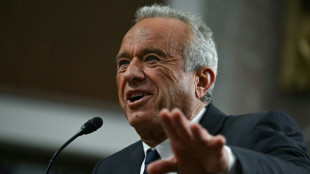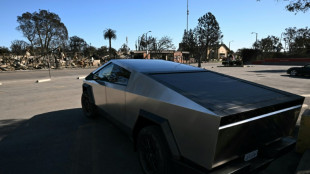
-
 Fenerbahce, Real Sociedad earn wins in Europa League play-offs
Fenerbahce, Real Sociedad earn wins in Europa League play-offs
-
Medvedev into first quarter-final of 2025 in Marseille

-
 Afghan arrested after car ramming 'attack' wounds 30 in Germany
Afghan arrested after car ramming 'attack' wounds 30 in Germany
-
Conservation efforts can shift nature loss to more vulnerable regions: study

-
 Ecuador's wild west shows limits of Noboa's 'iron fist'
Ecuador's wild west shows limits of Noboa's 'iron fist'
-
Estonians plead guilty to US charges in $577 mn crypto scheme

-
 WWF legal challenge against Norway deep-sea mining fails
WWF legal challenge against Norway deep-sea mining fails
-
Former Olympic champion Grospiron to take top 2030 Games post

-
 Lebanon says refuses Israeli demand to stay in five southern locations
Lebanon says refuses Israeli demand to stay in five southern locations
-
Trump launches 'reciprocal tariffs' targeting allies and adversaries

-
 Vaccine critic RFK Jr. confirmed as US health secretary
Vaccine critic RFK Jr. confirmed as US health secretary
-
Injury forces Olympic champion Hodgkinson out of 800m record bid in own race

-
 Swiatek tops Rybakina to reach Doha semi-finals
Swiatek tops Rybakina to reach Doha semi-finals
-
PGA Tour chief Monahan pleased with how LIV talks progressing

-
 Conflict puts question mark over Rwanda's world cycling championships
Conflict puts question mark over Rwanda's world cycling championships
-
France's Macron urges 'representative' governance in Syria

-
 Reindeer tensions stalk Swedish rally
Reindeer tensions stalk Swedish rally
-
LPGA adopts new pace of play policy with faster time deadlines

-
 Mexico threatens to sue Google over 'Gulf of America' name change
Mexico threatens to sue Google over 'Gulf of America' name change
-
Swedish video game maker wants industry to stop chasing money

-
 Jets moving on without Rodgers
Jets moving on without Rodgers
-
Afghan arrested after car ramming 'attack' wounds 28 in Germany

-
 US State Dept walks back purported $400 mn Tesla contract
US State Dept walks back purported $400 mn Tesla contract
-
Ubisoft revenue drops after game flops, 'Assassin's Creed' delays

-
 Turkey fines Adidas $15,000 for pigskin shoes
Turkey fines Adidas $15,000 for pigskin shoes
-
Swiatek, Alexandrova advance to Doha semi-finals

-
 Lower division USL plans rival to MLS
Lower division USL plans rival to MLS
-
What next for Honda and Nissan?

-
 Sexual violence against children soars in DR Congo: UNICEF
Sexual violence against children soars in DR Congo: UNICEF
-
Japan's Honda and Nissan scrap merger talks

-
 Vaccine critic RFK Jr. confirmed as health secretary
Vaccine critic RFK Jr. confirmed as health secretary
-
German sports carmaker Porsche to cut 1,900 jobs

-
 Bezos's Blue Origin rocket firm to cut 10% of workforce
Bezos's Blue Origin rocket firm to cut 10% of workforce
-
Kiwi Robinson happy to punch above her weight with world silver

-
 France says EU working toward 'rapid' easing of Syria sanctions
France says EU working toward 'rapid' easing of Syria sanctions
-
Norris vows to 'get elbows out' in fight with Verstappen for F1 crown

-
 'Patience paid off': Putin out of shadow after Trump call
'Patience paid off': Putin out of shadow after Trump call
-
Convicted murderers to be executed in Florida, Texas

-
 Polish court orders retrial in hot-button abortion case
Polish court orders retrial in hot-button abortion case
-
Zelensky wants plan to 'stop Putin' before US-Russia talks

-
 Afghan arrested after car ramming 'attack' injures 28 in Germany
Afghan arrested after car ramming 'attack' injures 28 in Germany
-
India's Modi seeks to boost Trump bromance on key visit

-
 French parliament votes to ban disposable e-cigarettes
French parliament votes to ban disposable e-cigarettes
-
Israel says Hamas must free three living hostages this weekend

-
 Alexandrova battles past Pegula into Doha semi-finals
Alexandrova battles past Pegula into Doha semi-finals
-
Trump's hand to Putin sparks fear, mistrust in frontline Ukraine

-
 Howley leaves Wales Six Nations coaching set-up
Howley leaves Wales Six Nations coaching set-up
-
President Trump says US 'reciprocal tariffs' to be announced Thursday

-
 Tens of thousands of Jordanians welcome king home after Trump meeting
Tens of thousands of Jordanians welcome king home after Trump meeting
-
Premier League sparks confusion by deleting statement on ban for Liverpool's Slot


What next for Honda and Nissan?
Honda and Nissan on Thursday announced the scrapping of merger talks that would have created the world's third-biggest auto company by unit sales behind Toyota and Volkswagen.
Here are some key points about why the Japanese companies explored a tie-up, the reasons for their failure, and where this leaves them in a difficult global auto industry.
- What is their history? -
Honda was founded in 1948 as a small factory making motorcycles and is now the world's biggest producer of the two-wheelers. It also makes 3.7 million four-wheel vehicles annually.
More than 40 percent of these were sold in North America last year, roughly 20 percent in China, 18 percent in Japan and three percent in Europe.
Nissan, founded in 1933, produced 3.1 million cars last year. North America accounts for 38 percent of its global sales, China 20 percent, Japan 14 percent and Europe 10 percent.
French automaker Renault took a 36.8 percent stake in the then loss-making firm in 1999 and Mitsubishi Motors joined the alliance 17 years later, with Nissan taking a 34-percent stake in its struggling Japanese rival.
But tensions emerged, stoked by the French state increasing its stake in Renault in 2015, followed by the 2018 arrest of Nissan boss Carlos Ghosn in Japan on suspicion of financial misconduct and his subsequent flight from the country.
In 2023, Renault sold part of its stake in Nissan as part of an alliance overhaul that saw them retain 15 percent cross-holdings.
- Why did they try to merge? -
Nissan has been struggling, last year reporting a 93-percent plunge in first-half net profit and axeing 9,000 jobs in November. It is also saddled with billions of dollars of debt.
For both companies, achieving economies of scale would have served to "enhance R&D capabilities, and better compete" in the areas of "advanced technologies including electrification and software-defined vehicles", said Tatsuo Yoshida, senior auto analyst at Bloomberg Intelligence.
Japanese carmakers have long lagged in the electric vehicle sector, especially against Chinese firms, with the country's leading EV-maker BYD last year selling more vehicles globally than Honda and Nissan.
The pair had already agreed on talks over partnership in electrification technologies and software development, and were later joined by Mitsubishi Motors.
- Why did merger talks fail? -
When the merger talks were announced in December the plan was that the two automakers along with Mitsubishi Motors would integrate their businesses under a new holding company.
But local media reports have said Honda, frustrated by its rival's slow decision-making on restructuring, wanted to make it a subsidiary, which Nissan's leadership found unacceptable.
"Nissan appears to be stressing its independence and freedom of (decision-making on) its strategy," which "for Honda's eyes may not maximise benefit of economy of scale," Mizuho Securities analyst Yoshitaka Ishiyama said.
- What happens next? -
In the long term at least, both firms will need to seek alternative partners as they look to get a leg-up in the technology race, analysts say.
"For Honda, there remains a concern about how to beef up its four-wheel vehicle business," said Seiji Sugiura, auto analyst at Tokai Tokyo Intelligence Laboratory.
"The fact that Honda executives had wanted to merge with Nissan means that they needed a close collaboration in R&D at a deeper level than an alliance, (which) involves sharing confidential company information," he added.
Nissan's position is worse, as it "faces significant challenges, including financial instability and the need to strengthen its position in the advanced technology battlefield", said Bloomberg's Yoshida.
Sugiura added that tech firm Foxconn "remains to be an option for Nissan".
Recent reports have said the Taiwanese giant, also known as Hon Hai, had been in talks with Renault over buying the French automaker's stake in the Japanese firm.
However, Sugiura added that a Foxconn-Honda tie-up was also possible "as it has technologies Honda wants".
And he added: "If Honda really wants Nissan's technology, it can launch a hostile takeover bid of Nissan."
R.Garcia--AT
